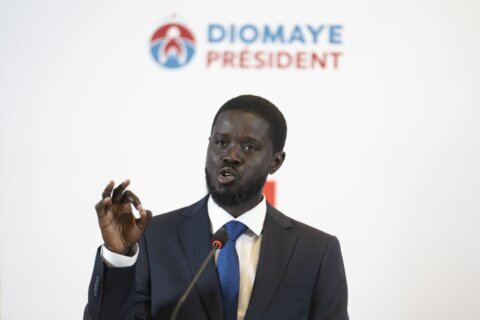ABUJA, Nigeria (AP) — Nigeria has designated armed groups blamed for hundreds of abductions and killings in northern areas as terrorist organizations, in a major swing in response to a key security challenge facing Africa’s most populous country.
The office of Nigeria’s attorney-general, Abubakar Malami, said in a statement Friday that the designation was made by a court following an application by the federal government. The court made its decision Thursday.
The decision will allow authorities to charge suspected members of the groups with terrorism-related offences, which some believe will lead to a more effective crackdown on their activities.
The Nigerian government argued in court documents that the groups’ activities should be considered terrorist acts as they “can lead to a breakdown of public order and safety and (pose) a threat to national security.”
The groups mostly consist of young men from the Fulani ethnic group, who had traditionally worked as nomadic cattle herders and are caught up in a decades-long conflict with Hausa farming communities over access to water and grazing land.
They often plunder villages in the northwest and central parts of the West African country, where they have killed thousands, and kidnapped hundreds of travelers and schoolchildren for ransom. The attacks have sometimes taken on religious dimensions.
In many remote communities in northern Nigeria, the gunmen outnumber and outgun security forces. When troops deployed to respond to attacks end their operations and depart, the groups return.
Some of the gunmen — who often operate in bands of more than 100, hiding out in abandoned forest reserves — have been joining forces with Islamic extremist rebels, security analysts and residents say.
Assaults on villages can often last hours. Last week more than 40 people were killed in the northwest Sokoto state in an attack that lasted through the night.
In the first half of 2021, at least 2,500 people were killed in the northwest and central states mostly as a result of such attacks, according to an analysis of media reports collated by the U.S. Council on Foreign Relations.
The gunmen, often referred to in Nigeria as bandits, have also abducted about 1,400 children from their schools over the last year and more than 100 of them have yet to be released. Sixteen children have died in the attacks.
The troubles in the northwest come in addition to the 10-year Islamic extremist insurgency in northeast Nigeria.
Nnamdi Obasi, the International Crisis Group’s Nigeria Senior Adviser, told The AP last month that Nigeria “could be heading from what we are calling banditry to a full-scale insurgency” if the government fails to act decisively.
Prosecution of the gunmen in the northwest is rare even when the military announces that dozens of them have been arrested. Umar Gwandu, a spokesperson for Nigeria’s attorney-general, said that part of the challenge was that the groups had not been banned as terrorist organizations.
“The security agencies can now lawfully declare war on the bandits,” he told The Associated Press Friday.
Copyright © 2024 The Associated Press. All rights reserved. This material may not be published, broadcast, written or redistributed.







